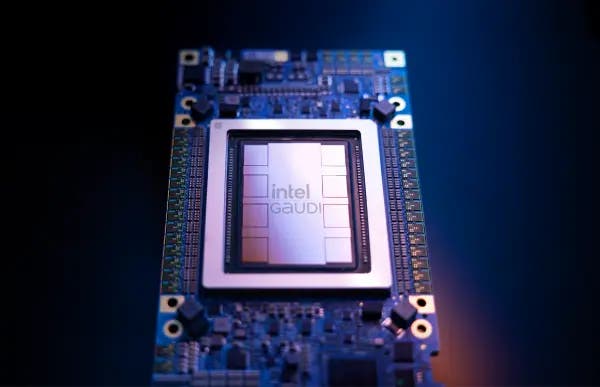Intel Reveals 8-Chip Gaudi 3 Platform Price, Upending Industry Norm Of Secrecy
by nlqip

While public pricing for CPUs has been standard in the data center industry, it’s been the opposite case for GPUs and other kinds of accelerator chips. An Intel exec explains to CRN why the company is changing its stance with the upcoming Gaudi 3 AI chips.
Intel said it’s upending a norm of secrecy in the data center accelerator chip space by revealing the list price of the star server platform for its upcoming Gaudi 3 AI chip.
On Tuesday at Computex 2024 in Taiwan, the semiconductor giant said its universal baseboard with eight Gaudi 3 OAM modules will have a list price of $125,000 for server vendors, including Dell Technologies, Hewlett Packard Enterprise, Lenovo and Supermicro, who plan to support the chip when it launches in the third quarter.
[Related: Intel’s Gaudi 3 AI Chip Targets Nvidia H100, H200; Scales To 8,000-Chip Clusters]
Intel made the disclosure after rivals Nvidia and AMD discussed plans at Computex earlier in the week to release new and more powerful accelerator chips every year, forecasting greater challenges ahead for the Santa Clara, Calif.-based chipmaker.
The $125,000 price puts the Gaudi 3 platform at two-thirds the estimated cost of Nvidia’s eight-GPU HGX H100 platform, which serves as the basis for the rival’s DGX H100 system and certain third-party servers, Anil Nanduri, vice president and head of Intel’s AI acceleration office told CRN in an interview last Friday.
While Nvidia does not disclose pricing of its data center GPUs or platforms, Intel’s calculation brings the estimated cost of an HGX H100 platform to roughly $187,000. Nanduri noted that pricing can vary based on volume and how a server is configured.
Combining the price with its performance capabilities, the Gaudi 3 chip provides 2.3 times greater performance-per-dollar than Nvidia’s H100 for inference throughput and 90 percent better performance-per-dollar for training throughput, according to testing by Intel.
The company also revealed a list price of $65,000 for a universal baseboard outfitted with eight of its Gaudi 2 chips that debuted in 2022. This puts the Gaudi 2 platform at one-third the estimated cost of Nvidia’s HGX H100 platform, it said.
Intel did not provide pricing for individual Gaudi 3 chips. The chips will debut in the third quarter with a PCIe version and the OAM version, the latter of which is based the Open Compute Project’s Accelerator Module design specification.
Why Intel Disclosed Gaudi 3’s Platform Price
Nanduri said Intel decided to disclose the list prices of its Gaudi 3 and Gaudi 2 platforms because it will help customers, particularly startups who typically don’t have visibility into behind-the-scenes pricing from vendors, plan investments in AI computing more easily.
“A lot of the innovation is happening from startups. They’re not familiar with the ecosystems [and] how the purchasing, procurement [and request for quotes] work, so it helps them get a framing of what to expect,” he said.
While public pricing for CPUs has been standard in the data center industry, it’s been the opposite case for GPUs and other kinds of accelerator chips, with vendors like Nvidia and AMD failing to publicly disclose such information in the past. Until now, Intel also had kept pricing secret for its GPUs and accelerator chips.
“We’ve historically done that with CPUs. When it comes to GPUs, the norm was pricing was always kind of a secret sauce,” Nanduri said.
Nanduri said the company decided to change its stance on pricing disclosures for accelerator chips as Gaudi 3 gained support not only from Dell, HPE, Lenovo and Supermicro but other major server players like Asus, Gigabyte and QCT, who announced plans to back the processor with their own systems this week at Computex.
What was becoming clear to Intel is that customers are becoming increasingly concerned with customizing AI models in a way that is “computationally sustainable from a cost perspective,” according to the Intel executive. These customers are also sensitive to costs related to inferencing, where, for instance, the number of words—or tokens in AI parlance—produced at a certain rate for a large language model becomes important.
“When customers look at the tokens throughput per dollar or the cost of a million tokens, you see a huge disparity in terms of the cost, and a lot of it is fundamentally driven by either the model size [or] the cost of the infrastructure,” he said.
Source link
lol
While public pricing for CPUs has been standard in the data center industry, it’s been the opposite case for GPUs and other kinds of accelerator chips. An Intel exec explains to CRN why the company is changing its stance with the upcoming Gaudi 3 AI chips. Intel said it’s upending a norm of secrecy in…
Recent Posts
- Arm To Seek Retrial In Qualcomm Case After Mixed Verdict
- Jury Sides With Qualcomm Over Arm In Case Related To Snapdragon X PC Chips
- Equinix Makes Dell AI Factory With Nvidia Available Through Partners
- AMD’s EPYC CPU Boss Seeks To Push Into SMB, Midmarket With Partners
- Fortinet Releases Security Updates for FortiManager | CISA
